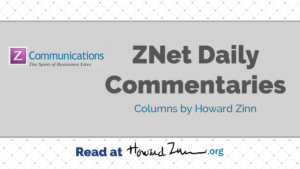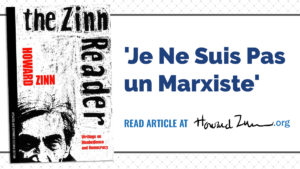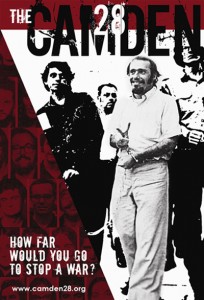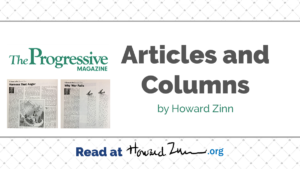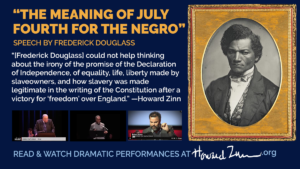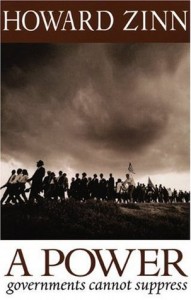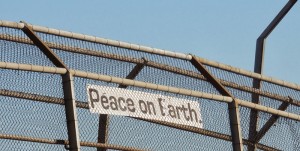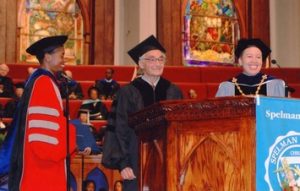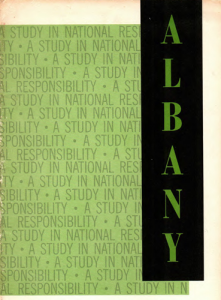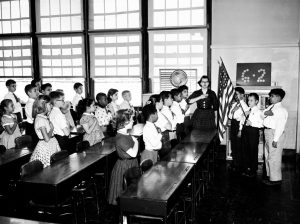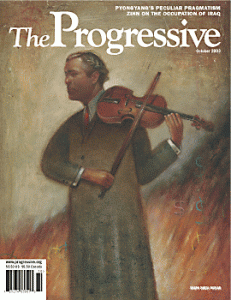Howard Zinn Digital Collection
 To inspire people to read, write, and make history
To inspire people to read, write, and make history
This digital collection is a searchable bibliography of materials by and about Howard Zinn, including books, articles, letters, films, audio, and photos from publishers, broadcasters, organizations, archives, libraries, and personal holdings. When possible, we have published the content or an excerpt for research and educational purposes. In most cases, we link out to where you can read, watch, or listen at the respective publisher or archive.
Do you know of something that should be listed? Let us know using our contact form.
-
Format
-
Content Type
-
Time Period
-
Source or Publisher
By Howard Zinn. ZCommunications. July 16, 1999. The Progressive, September 1999, as "Words in Encouragement."
"For those not in the know, let me explain that we who write for the progressive-radical movement have our specialties. Some specialize in writing depressing stuff. Others write humorous pieces. Some concentrate on trashing other Left writers. It seems that there was an opening this month for someone to inspire, and I was chosen. Not an easy job, when the United States government has just finished dropping thousands of cluster bombs on Yugoslavia…"
"For those not in the know, let me explain that we who write for the progressive-radical movement have our specialties. Some specialize in writing depressing stuff. Others write humorous pieces. Some concentrate on trashing other Left writers. It seems that there was an opening this month for someone to inspire, and I was chosen. Not an easy job, when the United States government has just finished dropping thousands of cluster bombs on Yugoslavia…"
By Howard Zinn. Article. ZCommunications, June 1988; Failure to Quit, and excerpted from The Zinn Reader.
Howard Zinn writes: For a long time I thought that there were important and useful ideas in Marxist philosophy and political economy that should be protected from the self-righteous cries on the right that "Marxism is dead,” as well as from the arrogant assumptions of the commissars of various dictatorships that their monstrous regimes represented “Marxism.”
Howard Zinn writes: For a long time I thought that there were important and useful ideas in Marxist philosophy and political economy that should be protected from the self-righteous cries on the right that "Marxism is dead,” as well as from the arrogant assumptions of the commissars of various dictatorships that their monstrous regimes represented “Marxism.”
Article by Howard Zinn. The Nation. October 27, 2008.
"It is sad to see both major parties agree to spend $700 billion of taxpayer money to bail out huge financial institutions that are notable for two characteristics: incompetence and greed."
"It is sad to see both major parties agree to spend $700 billion of taxpayer money to bail out huge financial institutions that are notable for two characteristics: incompetence and greed."
Article by Howard Zinn. The Progressive. July 2002.
"In the film Ocean's 11, eleven skillful crooks embark on an ingenious plan, meticulously worked out, to break into an impossibly secure vault and make off with more than $100 million in Las Vegas casino loot. Hardly a crime of passion.... No, money was the motive, with as little moral fervor attending the crime as went into the making of the movie, which had the same motive. I was reminded of this recently when I sat in a courtroom in Camden, New Jersey, and participated in the recollection of another break-in, carried out by the Camden 28, where the motive was to protest the war in Vietnam."
"In the film Ocean's 11, eleven skillful crooks embark on an ingenious plan, meticulously worked out, to break into an impossibly secure vault and make off with more than $100 million in Las Vegas casino loot. Hardly a crime of passion.... No, money was the motive, with as little moral fervor attending the crime as went into the making of the movie, which had the same motive. I was reminded of this recently when I sat in a courtroom in Camden, New Jersey, and participated in the recollection of another break-in, carried out by the Camden 28, where the motive was to protest the war in Vietnam."
Article by Howard Zinn. ZCommunications, September 29, 2000 and The Progressive, November 2000.
"There came a rare amusing moment in this election campaign when George Bush (who has $220 million dollars for his campaign) accused Al Gore (who has only $170 million dollars) of appealing to 'class warfare'.… I noticed that neither of the accused responded with a defiant 'Yes, we have classes in this country.' Only Ralph Nader has dared to suggest that this country is divided among the rich, the poor, and the nervous in between. This kind of talk is unpardonably rude, and would be enough to bar him from the televised debates."
"There came a rare amusing moment in this election campaign when George Bush (who has $220 million dollars for his campaign) accused Al Gore (who has only $170 million dollars) of appealing to 'class warfare'.… I noticed that neither of the accused responded with a defiant 'Yes, we have classes in this country.' Only Ralph Nader has dared to suggest that this country is divided among the rich, the poor, and the nervous in between. This kind of talk is unpardonably rude, and would be enough to bar him from the televised debates."
Article by Howard Zinn. The Progressive. March 2003.
"Men who have no respect for human life or for freedom or justice have taken over this beautiful country of ours. It will be up to the American people to take it back."
"Men who have no respect for human life or for freedom or justice have taken over this beautiful country of ours. It will be up to the American people to take it back."
Article by Howard Zinn. The Progressive. May 1999.
"A friend wrote to ask my opinion on Kosovo. He said many people were turning to him for answers, and he didn't know what to say, so he was turning to me (knowing, I guess, that I always have something to say, right or wrong). Several things seem clear to me, and they don't fit easily together in a way that points to a clean solution."
"A friend wrote to ask my opinion on Kosovo. He said many people were turning to him for answers, and he didn't know what to say, so he was turning to me (knowing, I guess, that I always have something to say, right or wrong). Several things seem clear to me, and they don't fit easily together in a way that points to a clean solution."
By Howard Zinn. Article. The Progressive. January 2000.
"What happened in Seattle recently was not as large an event as the general strike of 1919. But it showed how apparently powerless people—if they unite in large numbers—can stop the machinery of government and commerce. In an era when the power of government, and of multinational corporations, is overwhelming, it is instructive to get even a hint of how fragile that power is when confronted by organized, determined citizens."
"What happened in Seattle recently was not as large an event as the general strike of 1919. But it showed how apparently powerless people—if they unite in large numbers—can stop the machinery of government and commerce. In an era when the power of government, and of multinational corporations, is overwhelming, it is instructive to get even a hint of how fragile that power is when confronted by organized, determined citizens."
By Howard Zinn. Article. ZCommunications. July 4, 2000.
In this year 2000, I cannot comment more meaningfully on the Fourth of July than Frederick Douglass did when he was invited in 1852 to give an Independence Day address [on July 5]. He could not help thinking about the irony of the promise of the Declaration of Independence, of equality, life, liberty made by slaveowners, and how slavery was made legitimate in the writing of the Constitution after a victory for "freedom" over England."
In this year 2000, I cannot comment more meaningfully on the Fourth of July than Frederick Douglass did when he was invited in 1852 to give an Independence Day address [on July 5]. He could not help thinking about the irony of the promise of the Declaration of Independence, of equality, life, liberty made by slaveowners, and how slavery was made legitimate in the writing of the Constitution after a victory for "freedom" over England."
Article by Howard Zinn. The Progressive. February 2003.
"The long funeral procession for Phil Berrigan moved slowly through the streets of the poor Black parish in Baltimore where he had begun his priesthood. ...It was a bitterly cold December day in the kind of neighborhood where the city doesn't bother to clear the snow. People looked on silently from the windows of decaying buildings, and you could see the conditions that first provoked Phil's anger against the injustice of poverty in a nation of enormous wealth."
"The long funeral procession for Phil Berrigan moved slowly through the streets of the poor Black parish in Baltimore where he had begun his priesthood. ...It was a bitterly cold December day in the kind of neighborhood where the city doesn't bother to clear the snow. People looked on silently from the windows of decaying buildings, and you could see the conditions that first provoked Phil's anger against the injustice of poverty in a nation of enormous wealth."
Article by Howard Zinn. The Progressive. December 2001.
"I believe two moral judgments can be made about the present 'war': The September 11 attack constitutes a crime against humanity and cannot be justified, and the bombing of Afghanistan is also a crime, which cannot be justified. And yet, voices across the political spectrum, including many on the left, have described this as a 'just war.'"
"I believe two moral judgments can be made about the present 'war': The September 11 attack constitutes a crime against humanity and cannot be justified, and the bombing of Afghanistan is also a crime, which cannot be justified. And yet, voices across the political spectrum, including many on the left, have described this as a 'just war.'"
Article by Howard Zinn. The Progressive. December 2001.
"No killing of innocents, whether deliberate or 'accidental,' can be justified."
"No killing of innocents, whether deliberate or 'accidental,' can be justified."
By Howard Zinn. Article. Newsday. April 13, 2003.
At some point soon the United States will declare a military victory in Iraq. As a patriot, I will not celebrate. I will mourn the dead — the American GIs, and also the Iraqi dead, of which there will be many, many more. I will mourn the Iraqi children who may not die, but who will be blinded, crippled, disfigured, or traumatized, like the bombed children of Afghanistan who, as reported by American visitors, lost their power of speech.
At some point soon the United States will declare a military victory in Iraq. As a patriot, I will not celebrate. I will mourn the dead — the American GIs, and also the Iraqi dead, of which there will be many, many more. I will mourn the Iraqi children who may not die, but who will be blinded, crippled, disfigured, or traumatized, like the bombed children of Afghanistan who, as reported by American visitors, lost their power of speech.
By Howard Zinn. Article. ZCommunications. December 22, 1999. The Progressive, November 1999 as "Respecting the Holocaust."
"Some years ago, when I was teaching at Boston University, I was asked by a Jewish group to give a talk on the Holocaust. I spoke that evening, but not about the Holocaust of World War II, not about the genocide of six million Jews. It was the mid-Eighties, and the United States government was supporting death squad governments in Central America, so I spoke of the deaths of hundreds of thousands of peasants in Guatemala and El Salvador, victims of American policy. My point was that the memory of the Jewish Holocaust should not be encircled by barbed wire, morally ghettoized, kept isolated from other genocides in history."
"Some years ago, when I was teaching at Boston University, I was asked by a Jewish group to give a talk on the Holocaust. I spoke that evening, but not about the Holocaust of World War II, not about the genocide of six million Jews. It was the mid-Eighties, and the United States government was supporting death squad governments in Central America, so I spoke of the deaths of hundreds of thousands of peasants in Guatemala and El Salvador, victims of American policy. My point was that the memory of the Jewish Holocaust should not be encircled by barbed wire, morally ghettoized, kept isolated from other genocides in history."
Commentary by Howard Zinn. The Nation. August 1, 1987.
"The proper question, I believe, is not how good a document is or was the Constitution but, What effect does it have on the quality of our lives? And the answer to that, it seems to me, is, Very little. The Constitution makes promises it cannot by itself keep, and therefore deludes us into complacency about the rights we have."
"The proper question, I believe, is not how good a document is or was the Constitution but, What effect does it have on the quality of our lives? And the answer to that, it seems to me, is, Very little. The Constitution makes promises it cannot by itself keep, and therefore deludes us into complacency about the rights we have."
By Howard Zinn. Book - Nonfiction. City Lights Publishers. 2007.
A collection of essays on American history, class, immigration, justice, and ordinary citizens who have made a difference.
A collection of essays on American history, class, immigration, justice, and ordinary citizens who have made a difference.
Article by Howard Zinn. The Progressive. September 2005.
"As I write this, the frightening violence in Iraq continues, England and the United States are in a state of fear about suicide bombs, and the Senate is about to confirm a new, conservative Supreme Court justice. So it may seem peculiar to bring up a subject that is either at the far edge of all our attention, or over the edge and invisible. But here I go."
"As I write this, the frightening violence in Iraq continues, England and the United States are in a state of fear about suicide bombs, and the Senate is about to confirm a new, conservative Supreme Court justice. So it may seem peculiar to bring up a subject that is either at the far edge of all our attention, or over the edge and invisible. But here I go."
Article by Howard Zinn. The Progressive. January 2006.
"The war against Iraq, the assault on its people, the occupation of its cities, will come to an end, sooner or later. The process has already begun. The first signs of mutiny are appearing in Congress. The first editorials calling for withdrawal from Iraq are beginning to appear in the press. The anti-war movement has been growing, slowly but persistently, all over the country."
"The war against Iraq, the assault on its people, the occupation of its cities, will come to an end, sooner or later. The process has already begun. The first signs of mutiny are appearing in Congress. The first editorials calling for withdrawal from Iraq are beginning to appear in the press. The anti-war movement has been growing, slowly but persistently, all over the country."
By Howard Zinn. Speech and article. Spelman College. May 15, 2005.
In 1963, Howard Zinn was fired from Spelman College because of his support for students' civil rights activism. In 2005, he was invited back by President Beverly Daniel Tatum to give the commencement address. Here is the text of that speech, given on May 15, 2005, and published in Original Zinn: Conversations on History and Politics.
In 1963, Howard Zinn was fired from Spelman College because of his support for students' civil rights activism. In 2005, he was invited back by President Beverly Daniel Tatum to give the commencement address. Here is the text of that speech, given on May 15, 2005, and published in Original Zinn: Conversations on History and Politics.
By Howard Zinn. Report. Southern Regional Council. 1962.
Report of the investigation Zinn did on the mass civil rights demonstrations in Albany, Georgia.
Report of the investigation Zinn did on the mass civil rights demonstrations in Albany, Georgia.
Article by Howard Zinn. The Progressive. April 2006.
"Now that most Americans no longer believe in the war, now that they no longer trust Bush and his Administration, now that the evidence of deception has become overwhelming (so overwhelming that even the major media, always late, have begun to register indignation), we might ask: How come so many people were so easily fooled?"
"Now that most Americans no longer believe in the war, now that they no longer trust Bush and his Administration, now that the evidence of deception has become overwhelming (so overwhelming that even the major media, always late, have begun to register indignation), we might ask: How come so many people were so easily fooled?"
Article by Howard Zinn. The Progressive. October 2003.
"We became familiar with the term 'occupied country' during World War II. We talked of German-occupied France, German-occupied Europe. And after the war we spoke of Soviet-occupied Hungary, Czechoslovakia, Eastern Europe. It was the Nazis, the Soviets, who occupied other countries. Now we are the occupiers."
"We became familiar with the term 'occupied country' during World War II. We talked of German-occupied France, German-occupied Europe. And after the war we spoke of Soviet-occupied Hungary, Czechoslovakia, Eastern Europe. It was the Nazis, the Soviets, who occupied other countries. Now we are the occupiers."
By Howard Zinn. Article. ZCommunications. March 27, 2007.
If somebody invaded your home, and smashed things up, and terrorized your children, would we give them a timetable? When I look at this latest Democratic proposal for a timetable, you know, maybe 18 months from now, at the same time funding the war for another 140 billion dollars, you know, it’s as if you gave an intruder in your house a timetable for withdraw, and meanwhile, made a nice dinner for him. No, we can’t do that, we have to get out.
If somebody invaded your home, and smashed things up, and terrorized your children, would we give them a timetable? When I look at this latest Democratic proposal for a timetable, you know, maybe 18 months from now, at the same time funding the war for another 140 billion dollars, you know, it’s as if you gave an intruder in your house a timetable for withdraw, and meanwhile, made a nice dinner for him. No, we can’t do that, we have to get out.
By Howard Zinn. Article. ZCommunications. April 2, 2008.
We might wonder why no Democratic Party contender for the presidency has invoked the memory of the New Deal and its unprecedented series of laws aimed at helping people in need. The New Deal was tentative, cautious, bold enough to shake the pillars of the system but not to replace them. It created many jobs but left 9 million unemployed. It built public housing but not nearly enough. It helped large commercial farmers but not tenant farmers. ...Still, in today’s climate of endless war and uncontrolled greed, drawing upon the heritage of the 1930s would be a huge step forward.
We might wonder why no Democratic Party contender for the presidency has invoked the memory of the New Deal and its unprecedented series of laws aimed at helping people in need. The New Deal was tentative, cautious, bold enough to shake the pillars of the system but not to replace them. It created many jobs but left 9 million unemployed. It built public housing but not nearly enough. It helped large commercial farmers but not tenant farmers. ...Still, in today’s climate of endless war and uncontrolled greed, drawing upon the heritage of the 1930s would be a huge step forward.
By Howard Zinn. Article. The Progressive. May 2007.
"When a social movement adopts the compromises of legislators, it has forgotten its role, which is to push and challenge the politicians, not to fall in meekly behind them. As I write this, Congress is debating timetables for withdrawal from Iraq. In response to the Bush Administration’s 'surge' of troops, and the Republicans’ refusal to limit our occupation, the Democrats are behaving with their customary timidity, proposing withdrawal, but only after a year, or eighteen months. And it seems they expect the anti-war movement to support them."
Pages

